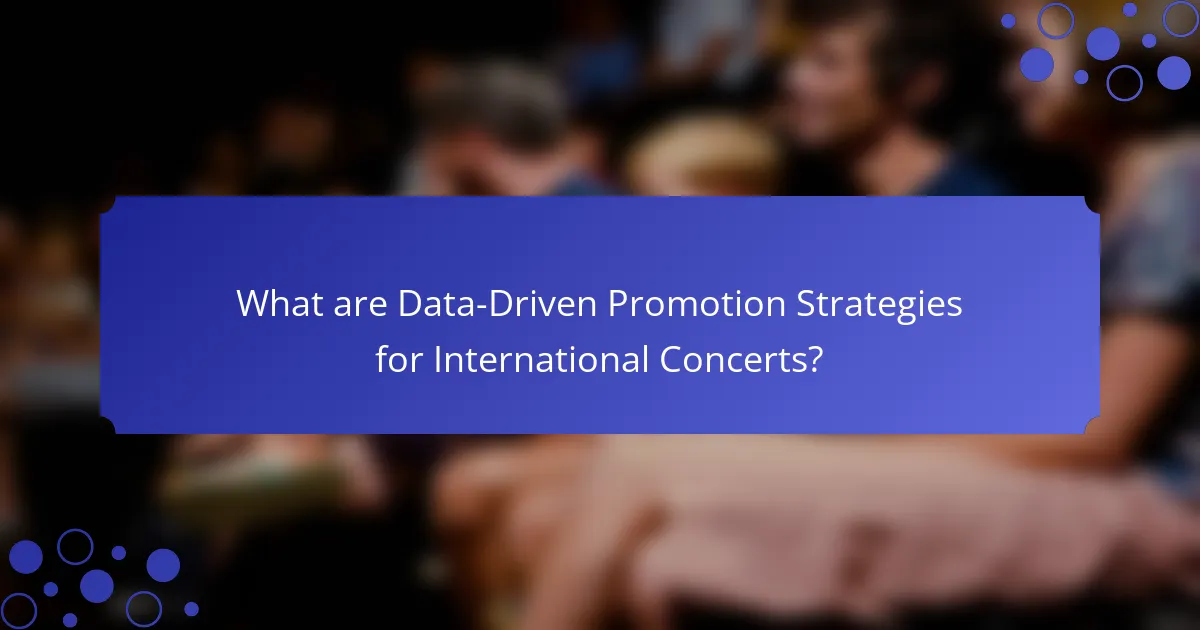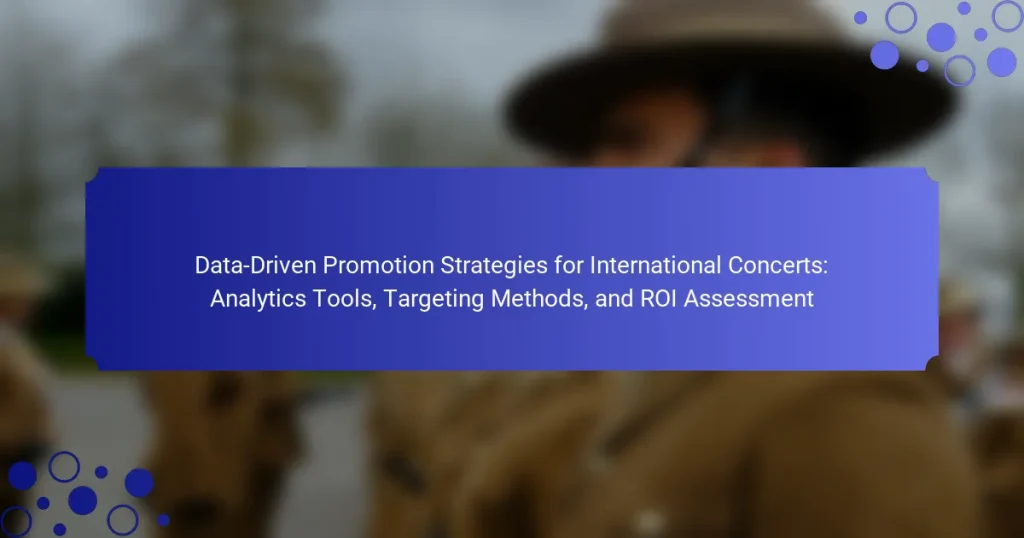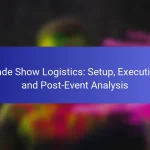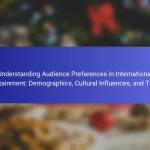Data-driven promotion strategies for international concerts leverage analytics to enhance marketing effectiveness. These strategies encompass audience segmentation, utilizing tools such as Google Analytics and social media metrics to create targeted campaigns. By analyzing ticket sales data, marketers can identify high-performing markets and personalize email marketing based on customer behavior. Additionally, social media advertisements are customized according to audience demographics and interests, while A/B testing is employed to refine promotional content. Research indicates that these data-driven approaches can significantly increase ticket sales and engagement, with studies showing potential conversion rate boosts of up to 30%.

What are Data-Driven Promotion Strategies for International Concerts?
Data-driven promotion strategies for international concerts involve using analytics to optimize marketing efforts. These strategies include audience segmentation based on data insights. Marketers utilize tools like Google Analytics and social media metrics for targeted campaigns. They analyze ticket sales data to identify high-performing markets. Email marketing campaigns are personalized using customer behavior data. Social media ads are tailored based on audience demographics and interests. A/B testing is employed to refine promotional content. These strategies have been shown to increase ticket sales and engagement significantly. For example, a study by Eventbrite found that data-driven marketing can boost conversion rates by up to 30%.
How do analytics tools enhance promotion strategies for concerts?
Analytics tools enhance promotion strategies for concerts by providing data-driven insights. These tools analyze audience demographics, preferences, and behaviors. They help identify target markets and optimal promotion channels. By tracking engagement metrics, analytics tools refine marketing tactics in real-time. This leads to more effective ad spend and higher ticket sales. For example, a study by Eventbrite showed that targeted email campaigns can increase ticket sales by up to 30%. Additionally, social media analytics reveal which content resonates most with audiences, guiding promotional efforts. Overall, analytics tools drive strategic decision-making for concert promotions.
What types of analytics tools are commonly used in concert promotions?
Commonly used analytics tools in concert promotions include ticketing platforms, social media analytics, and customer relationship management (CRM) systems. Ticketing platforms like Ticketmaster provide data on sales trends and customer demographics. Social media analytics tools such as Facebook Insights and Twitter Analytics track audience engagement and marketing effectiveness. CRM systems like Salesforce help manage customer data and analyze purchasing behavior. These tools enable promoters to make informed decisions based on real-time data. They enhance targeting strategies and improve ROI assessments.
How do these tools gather and analyze data?
Analytics tools gather data through various methods such as web scraping, user tracking, and surveys. They collect information from websites, social media, and user interactions. These tools analyze data using algorithms and statistical models. They identify patterns and trends in consumer behavior. Machine learning techniques enhance their predictive capabilities. Data visualization tools present insights in an understandable format. For example, Google Analytics tracks website traffic and user engagement metrics. This method provides concrete insights into audience preferences and behaviors.
What targeting methods are effective for promoting international concerts?
Effective targeting methods for promoting international concerts include demographic targeting, geographic targeting, and interest-based targeting. Demographic targeting focuses on age, gender, and income levels to identify potential concertgoers. Geographic targeting utilizes location data to reach audiences in specific regions or cities where concerts are held. Interest-based targeting leverages social media and online behaviors to connect with fans of similar music genres or artists.
Data from Statista shows that targeted advertising can increase engagement rates by up to 50%. Additionally, using analytics tools helps refine these targeting methods by providing insights into audience preferences and behaviors. This data-driven approach ensures that promotional efforts are directed towards the most likely attendees, maximizing ticket sales and event success.
How can demographic data improve targeting for concert promotions?
Demographic data can significantly enhance targeting for concert promotions. It allows promoters to identify specific audience segments based on age, gender, income, and location. For instance, knowing that a particular age group prefers a specific genre helps tailor marketing messages effectively. According to a study by Eventbrite, 78% of consumers are more likely to attend events that resonate with their demographic profile. This data-driven approach ensures promotional efforts reach the most interested audiences, increasing ticket sales and engagement. By utilizing demographic insights, promoters can optimize advertising channels, such as social media platforms favored by younger audiences. This targeted strategy leads to higher conversion rates and improved return on investment for concert promotions.
What role does geographic data play in targeting concert audiences?
Geographic data plays a crucial role in targeting concert audiences. It helps identify where potential attendees are located. This information allows promoters to tailor marketing efforts effectively. For instance, analyzing local demographics can reveal preferences for specific music genres. Geographic data also informs decisions on venue selection based on audience density. Additionally, it enables targeted advertising through social media and email campaigns. According to a study by Eventbrite, 63% of event organizers use geographic data to enhance their targeting strategies. This data-driven approach increases ticket sales and improves overall event success.
What is the importance of ROI assessment in concert promotions?
ROI assessment in concert promotions is crucial for measuring the financial success of events. It helps promoters understand the profitability of their investments. By analyzing costs against revenue generated, promoters can make informed decisions. This assessment identifies which marketing strategies yield the best returns. It also highlights areas needing improvement for future promotions. According to a study by Eventbrite, 70% of successful promoters regularly assess ROI. This practice leads to optimized budget allocations and enhanced audience targeting. Ultimately, ROI assessment drives better planning and execution of concert promotions.
How can promoters measure the success of their strategies?
Promoters can measure the success of their strategies through various metrics and analytics tools. Key performance indicators (KPIs) such as ticket sales, audience engagement, and social media reach provide quantifiable data. For instance, tracking ticket sales before and after a marketing campaign offers insight into its effectiveness. Audience engagement can be assessed through metrics like likes, shares, and comments on promotional content. Additionally, promoters can analyze website traffic and conversion rates to understand how well their strategies drive potential attendees to purchase tickets. According to a report by Eventbrite, successful campaigns often see a 30% increase in ticket sales when utilizing targeted digital marketing. This data reinforces the importance of analytics in evaluating promotional effectiveness.
What key performance indicators (KPIs) should be tracked?
Key performance indicators (KPIs) that should be tracked include ticket sales, audience engagement, and marketing reach. Ticket sales measure the revenue generated from concert attendance. Audience engagement can be assessed through social media interactions and email open rates. Marketing reach indicates the effectiveness of promotional campaigns through metrics such as impressions and click-through rates. Tracking these KPIs allows for data-driven decision-making in concert promotion strategies.
How do data-driven strategies integrate analytics tools and targeting methods?
Data-driven strategies integrate analytics tools and targeting methods by leveraging data insights to enhance marketing effectiveness. Analytics tools collect and analyze data on audience behavior and preferences. These insights inform targeting methods, allowing marketers to reach specific demographics more accurately. For example, tools like Google Analytics provide real-time data on user interactions. Marketers can use this data to tailor campaigns that resonate with identified audience segments. This integration leads to improved engagement rates and higher conversion rates. Studies show that targeted marketing can increase ROI by up to 20%. Thus, effective integration of analytics and targeting is crucial for maximizing promotional success in international concerts.
What challenges are faced when implementing data-driven promotion strategies?
Implementing data-driven promotion strategies presents several challenges. One significant challenge is data quality. Inaccurate or incomplete data can lead to misguided targeting efforts. Another challenge is the integration of disparate data sources. Combining data from various platforms can be technically complex. Additionally, there is often a lack of skilled personnel. Professionals with expertise in data analytics are essential for effective strategy execution. Privacy concerns also pose a challenge. Regulations like GDPR limit how data can be collected and used. Lastly, measuring ROI accurately can be difficult. Establishing clear metrics and tracking them consistently is crucial for success.
What specific analytics tools should concert promoters consider using?
Concert promoters should consider using analytics tools like Google Analytics, Eventbrite Analytics, and Facebook Insights. Google Analytics tracks website traffic and user behavior, providing insights into audience demographics and engagement. Eventbrite Analytics offers data on ticket sales and attendee demographics, helping promoters understand their audience better. Facebook Insights delivers engagement metrics for promotional content, allowing promoters to optimize their social media strategies. These tools collectively enable concert promoters to make data-driven decisions and enhance their promotional effectiveness.
How does each tool contribute to the promotion process?
Each tool contributes to the promotion process by enhancing targeted outreach and optimizing marketing efforts. Analytics tools provide insights into audience behavior and preferences. This data allows promoters to tailor their messaging effectively. Social media platforms facilitate direct engagement with potential attendees. Email marketing tools help in sending personalized promotions to segmented lists. Advertising tools enable precise targeting based on demographics and interests. Together, these tools create a cohesive strategy that increases ticket sales and boosts event visibility.
What are the costs associated with these tools?
The costs associated with analytics tools for data-driven promotion strategies vary widely. Basic analytics tools can range from free to several hundred dollars per month. Advanced tools with comprehensive features may cost from $500 to $2,000 monthly. Additional costs may include setup fees, training, and ongoing support. Some platforms also charge based on the volume of data processed or the number of users. For example, a popular analytics tool may charge $1,200 annually for a standard package. These costs are essential for understanding audience behavior and optimizing marketing strategies.
What best practices should be followed for successful data-driven promotions?
Successful data-driven promotions require a clear understanding of the target audience. Segmenting the audience based on demographics and behavior enhances personalization. Utilizing analytics tools to track engagement and conversion rates is crucial. A/B testing different promotional strategies helps identify the most effective methods. Integrating customer feedback into promotional efforts can refine approaches. Monitoring real-time data allows for agile adjustments to campaigns. Establishing measurable goals ensures the effectiveness of promotions can be assessed. Regularly reviewing and analyzing past campaigns provides insights for future strategies.
Data-Driven Promotion Strategies for International Concerts focus on utilizing analytics to enhance marketing efforts, including audience segmentation and targeted campaigns. The article examines various analytics tools such as Google Analytics and social media metrics, which help identify high-performing markets and personalize email marketing. It also discusses effective targeting methods based on demographic and geographic data, the importance of ROI assessment, and best practices for successful promotions. Key performance indicators (KPIs) are highlighted for measuring campaign success, emphasizing the integration of analytics tools and strategies to maximize ticket sales and engagement.


